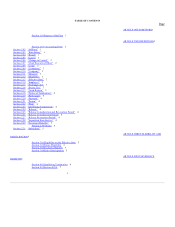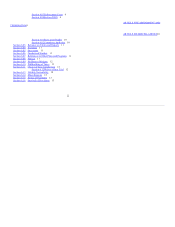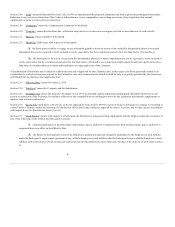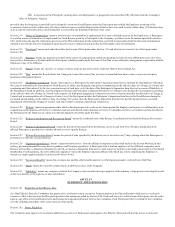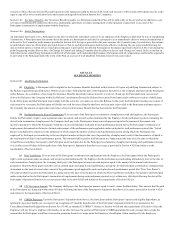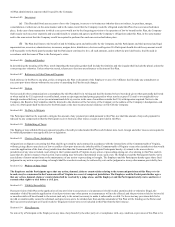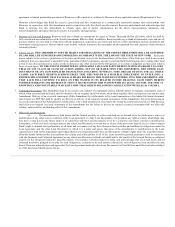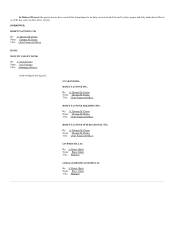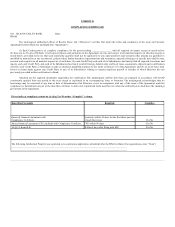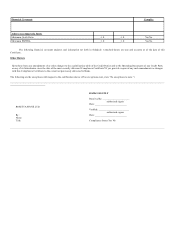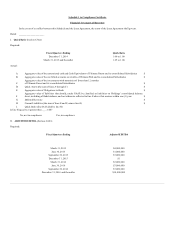Rosetta Stone 2015 Annual Report Download - page 133
Download and view the complete annual report
Please find page 133 of the 2015 Rosetta Stone annual report below. You can navigate through the pages in the report by either clicking on the pages listed below, or by using the keyword search tool below to find specific information within the annual report.
the expense incurred) no later than 30 days following the date on which the Participant incurs the corresponding eligible expense; (ii) subject to any shorter
time period provided in any expense reimbursement policy of the Employer or specifically provided otherwise in this Plan, the Employer shall make the
Reimbursement to the Participant on or before the last day of the calendar year following the calendar year in which the Participant incurred the eligible
expense; (iii) the Participant’s right to Reimbursement shall not be subject to liquidation or exchange for another benefit; (iv) the amount eligible for
Reimbursement in one calendar year shall not affect the amount eligible for Reimbursement in any other calendar year; and (v) except as specifically
provided otherwise in this Plan, the period during which the Participant may incur expenses that are eligible for Reimbursement is limited to five calendar
years following the calendar year in which the Participant’s Separation from Service occurs.
Section 4.03 Enforcement Costs
All expenses of a Participant incurred in enforcing the Participant’s rights and/or to recover the Participant’s benefits under this Article Four, including but
not limited to, reasonable attorneys’ fees, court costs, arbitration costs, and other reasonable expenses shall be paid by the Company if the Participant prevails
on any substantive issue in such proceeding. The Company shall pay or reimburse the Participant for such fees, costs and expenses, promptly upon
presentment of appropriate documentation, subject to Section 4.02(g).
Section 4.04 Section 280G
(b) A Participant shall bear all expense of, and be solely responsible for, any Excise Tax; provided, however, that any payment or benefit received
or to be received by the Participant (whether payable under the terms of this Plan or any other plan, arrangement or agreement with the Employer or any of its
Affiliates (collectively, the “Payments”) that would constitute a “parachute payment” within the meaning of Code Section 280G shall be reduced to the
extent necessary so that no portion thereof shall be subject to the Excise Tax but only if, by reason of such reduction, the net after-tax benefit received by the
Participant shall exceed the net after-tax benefit that would be received by the Participant if no such reduction was made.
(c) The “net after-tax benefit” shall mean (i) the Payments which the Participant receives or is then entitled to receive from the Employer that
would constitute “parachute payments” within the meaning of Code Section 280G, less (ii) the amount of all federal, state and local income and employment
taxes payable by the Participant with respect to the foregoing calculated at the highest marginal income tax rate for each year in which the foregoing shall be
paid to the Participant (based on the rate in effect for such year as set forth in the Code as in effect at the time of the first payment of the foregoing), less (iii)
the amount of Excise Tax imposed with respect to the payments and benefits described in (b)(i) above.
(d) All determinations under this Section 4.04 will be made by an Accounting Firm. The Accounting Firm shall be required, in part, to evaluate the
extent to which payments are exempt from Section 280G as reasonable compensation for services rendered before or after the Change in Control. All fees and
expenses of the Accounting Firm shall be paid solely by the Company. The Company will direct the Accounting Firm to submit any determination it makes
under this Section 4.04 and detailed supporting calculations to both the Participant and the Company as soon as reasonably practicable following the
Change in Control.
(e) If the Accounting Firm determines that one or more reductions are required under this Section 4.04, such Payments shall be reduced in the order
that would provide the Participant with the largest amount of after-tax proceeds (with such order, to the extent permitted by Code Sections 280G and 409A
designated by the Participant, or otherwise determined by the Accounting Firm) to the extent necessary so that no portion thereof shall be subject to the
Excise Tax, and the Company shall pay such reduced amount to the Participant. The Participant shall at any time have the unilateral right to forfeit any
equity award in whole or in part.
(f) As a result of the uncertainty in the application of Code Section 280G at the time that the Accounting Firm makes its determinations under this
Section 4.04, it is possible that amounts will have been paid or distributed to the Participant that should not have been paid or distributed (collectively, the
“Overpayments”), or that additional amounts should be paid or distributed to the Participant (collectively, the “Underpayments”). If the Accounting Firm
determines, based on either the assertion of a deficiency by the Internal Revenue Service against the Employer or the Participant, which assertion the
Accounting Firm believes has a high probability of success or is otherwise based on controlling precedent or substantial authority, that an Overpayment has
been made, the Participant must repay the Overpayment to the Company, without interest; provided, however, that no loan will be deemed to have been made
and no amount will be payable by the Participant to the Company unless, and then only to the extent that, the deemed loan and payment would either reduce
the amount on which the Participant is subject to tax under Code Section 4999 or generate a refund of tax imposed under Code Section 4999. If the
Accounting Firm determines, based upon controlling precedent or substantial authority, that an Underpayment has occurred, the Accounting Firm will notify
the Participant and the Company of that determination, and the Company will promptly pay the amount of that Underpayment to the Participant without
interest.
(g) The parties will provide the Accounting Firm access to and copies of any books, records, and documents in their possession as reasonably
requested by the Accounting Firm, and otherwise cooperate with the Accounting Firm in connection with the preparation and issuance of the determinations
and calculations contemplated by this Section 4.04. For purposes of making the calculations required by this Section 4.04, the Accounting Firm may rely on
reasonable, good faith interpretations concerning the application of Code Sections 280G and 4999.
ARTICLE 5
AMENDMENT AND TERMINATION
Subject to the next sentence, the Committee shall have the right at any time and from time to time, by instrument in writing, to amend, modify, alter, or
terminate the Plan in whole or in part. Notwithstanding the foregoing or anything in this Plan to the contrary, the Committee may not amend, modify, alter or



